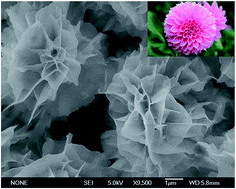Enantioselective transesterification of (R,S)-2-pentanol catalyzed by a new flower-like nanobioreactor
Abstract
The lipase-incorporated nanoflower was prepared and used for resolution of (R,S)-2-pentanol with vinyl acetate as an acyl donor in organic solvents. SEM images indicated that the lipase-incorporated nanoflower had high surface area which was favourable for mass transfer. The FTIR spectrum identified the presence of the lipase in the nanoflower. The lipase-incorporated nanoflower could display its maximum enzyme activity (22.5 μmol h−1 mg−1) and good enantioselectivity (E value, 47.3) under the optimal reaction conditions (in cyclohexane at 60 °C and water activity of 0.10). After ten continuous batches, the nanoflower retained 98.7% of the initial enzyme activity and 95.6% of the initial enantioselectivity.


 Please wait while we load your content...
Please wait while we load your content...